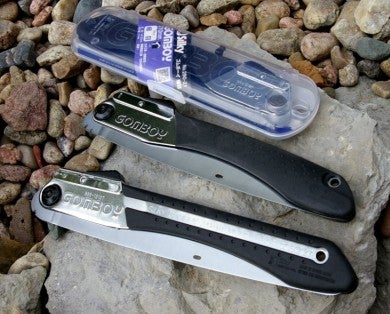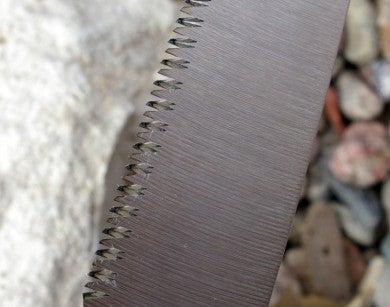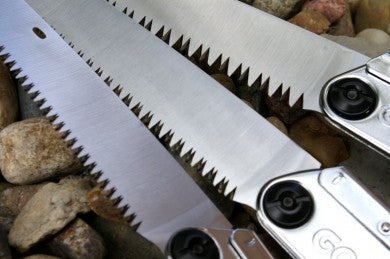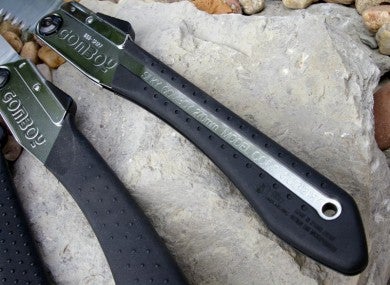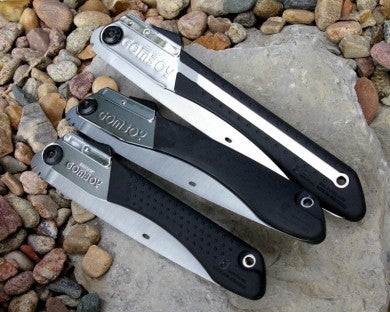The Ultimate Folding Survival Saw: Silky Gomboy
Major Pandemic 02.25.14
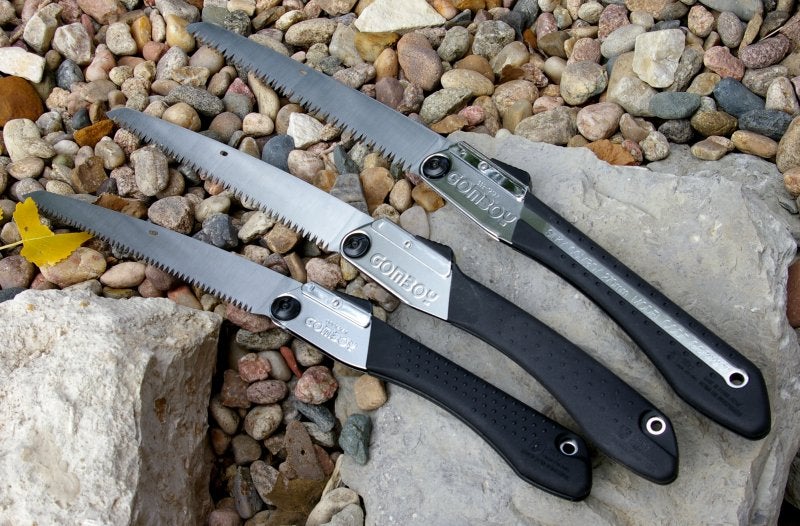
I have a long history with Silky. In fact, at one time I owned a business that was one of the largest Silky retailers in the US. During that time, when I was selling Silky products, I was constantly surprised by their unequaled quality and customer satisfaction. We always had a constant supply moving to arborist, forest preserves, national parks, and large commercial tree farms. The feedback from these professionals who were using and abusing these saws on a daily basis was always positive, with the notes that they previously purchased X brand and now only buy Silky.
Why am I espousing the legendary greatness of Silky tree trimming saws? Simple. Because if they can excel above all brands at hard use duties at a professional level, then they will certainly deliver everything you need as a backwoods survival saw when your life or hunt is on the line. Silky has a huge selection of various saws, curved or straight blades, and extra-fine to extra-coarse teeth models. I reached for the top and selected three differently sized saws from the steel-handled GOMBOY line, which is the pinnacle of the entire Silky folding saw family.
Silky saws are manufactured in Ono Japan, which is the epicenter of the finest cutlery steel production in the world. Silky uses these very high grade, pure steel sources to make blades that are less prone to breakage, hold an edge longer, and cut faster than any other saw on the market. The company has been achieving these goals since the 1900s, and it has continued to innovate and raise the bar for quality, endurance, and cutting efficiency.
In the 1980s, Silky patented its own saw grind process, and today that process still delivers the best sharpness in the industry. In 1985, Silky launched the GOMBOY line, which received accolades and awards globally. Today the GOMBOY is still considered the pinnacle of folding saws. Silky saws are distributed in the USA and Central America by Sherrill, Inc, where I purchased my three Silky Gomboy Folding Saws.
Fit, Finish, Feel, and Features
For those familiar with higher quality pocket knives, you’ll see that same high quality fit and finish in each of the Silky saw blades, all of which are easily replaceable once the long lived blades dull. All blades are an unique alloy steel that’s produced exclusively for Silky. The alloy is impulse hardened to create a harder, longer lasting cutting point, with exceptional tensile strength and an ideal combination of hardness and flexibility.
One of Silky’s pioneering blade designs was the tapered shape of the blades where the blade is fattest at the teeth and skinniest at the spine. This blade design significantly decreases binding and speeds the cutting stroke, all while increasing cutting ability and tooth strength. Silky’s blade teeth are a proprietary patented design which cut faster, last longer, bind less, and cut with less effort.
The blades all lock open for safety with a knife style back-lock. I would never buy a folding saw that did not have this feature, as I have seen non-locking saws fold up on people’s hands and it is not pretty.
Historically, I have never had a problem with a Silky handle breaking, but I have seen other manufacturers handles break. The GOMBOY’s steel handle is virtually unbreakable, and with the permanently molded on rubber covering, it provides the most stable hold in the business. Other features are a lanyard hole that’s sized to easily accept paracord and a simple bolt and nut blade pivot setup to swap blades or adjust blade tension.
Functions
Silky offers a full range of fine to coarse toothed replacement and spare blades that can be swapped out in a few minutes, but they have extra-coarse and extra-fine blades available for some models, as well. The key to saws is selecting the right blade for the job and material.
Each of the GOMBOY saws I selected feature straight blades, which allow straight precision cuts to be made for shelter building, traps, and other bushcraft needs. Straight blades are also easier to control and deliver a smoother overall cut.
Silky also offers curved blades for higher speed cutting. These are for felling limbs and removing branches, but you lose the ability to do a straight cut for notches and shelter building. Having personally used curved blades, they are great for fast trimming, but not so great for bushcraft use.
Tooth selection is also important. The generally accepted rule is the harder and drier the wood, the finer the teeth needed to produce a smooth working cut and stroke. This is generally why you hear so many survival experts recommend a medium-toothed saw (8-9 teeth per inch), because it fits so many applications well. In most cases, shelter materials are generally the softer willow/cottonwood type trees, which large teeth will work just fine on, but if you live in a hardwood prominent area, you may want to consider a fine toothed saw.
Another factor is the size of the blade. You can get away with a coarser teeth on a longer blade because of the leverage and stroke length. The smaller the blade the finer the teeth required to produce a smooth stroke on very dry or hard woods. In my testing, I validated this theory with both oak and dry shipping pallet wood. Based on my testing, I concur that medium teeth blades are still the recommendation for the survivalist and outdoorsman.
Around my area, willow/cottonwood trees abound, and in any of these cases all these saws delivered excellent cutting capabilities. Although the fine teeth really slowed down the speed of the cuts, it did deliver craftsman level precision cuts. The coarser the teeth, the faster the job ended.
One of the things I wanted to test was maximum branch cutting diameter versus blade length. Sure, you could work your way through a 8’ great redwood trunk with a 3” saw, but logically a large blade should work better. Most arborists recommend a saw with a blade length at least three times the width of the branch for a clean cut. In my case, the GOMBOY 270mm would match up nicely to a 3.5” limb, the GOMBOY 240mm to a 3” limb, and the GOMBOY 210mm to a limb around 2.5”.
In testing on my plague of cottonwood trees, this 1” of limb for every 3” of blade turned out to be a very effective and pleasant cutting ratio. Fatigue and aggravation increased proportionally from there as limb sizes increased and blade sizes stayed the same.
I did manage to cut an sizable 8” log with the big GOMBOY 270mm, but I never wish to repeat that experiment ever again. The take-away from that sweaty testing adventure was to pack as large a saw as you’re able to carry if you expect to cut anything substantial. For most tree stand trimming needs and outdoor survival packs for bushcraft and shelter building, the GOMBOY 210mm and 240mm models would be just fine. If you plan on building a small fort or something more substantial, I would increase the saw size.
For bushcraft work, all three saws delivered the precision and notches needed for survival, but I am planning on picking up a replacement medium tooth blade for the big 270mm GOMBOY to make precision cuts a bit smoother. You will be amazed at the size of limbs these Silky saws can cut through quickly.
Final Thoughts
As I cruise the local home improvement stores, I see the competing $10-$20 folding saws on the shelf, and they look like junk compared to the Silky saws. Of course, you do not need to reach for the top end of the Silky line, as they have the same great blades in less expensive polymer F180 handled lines that start just above $30. In those lines you’ll have one of the best blades in the business with just a bit shorter blade.
As with everything I write about, I like to find great products that you can use and appreciate now, but that will also help you get ouf a bind if your life depends on it. A decent sized folding hand saw is one of those indispensable items that can help clear debris around your home and property after a storm, make precise pruning cuts to your trees each year, help you clear a path to your favorite tree stand, and of course assure your shelter and survival in a bad situation. $50 is a small price to pay for a tool this useful.
294-27 GOMBOY 270mm Large Teeth
- MSRP: $50.95
- 270mm folding hand saw, 10.6-in blade 22.24-in overall length
- 5 teeth per inch
- 0.65 lbs
- Limited lifetime warranty against defects in material and workmanship
121-24 GOMBOY 240mm Medium Teeth
- MSRP: $47.95
- 9-1/2-inch (240 mm) blade length
- 12 teeth per inch (14 teeth per 30 mm) teeth configuration
- 0.6 pounds (260 grams) operating weight; 0.8 pounds (360 grams) weight with carrying case
- Limited lifetime warranty against defects in material and workmanship
290-21 GOMBOY 210mm Fine Teeth
- MSRP: $41.95
- 8-1/3-inch (210 mm) blade length
- 8.5 teeth per inch (10 teeth per 30 mm) teeth configuration
- 0.55 pounds (240 grams) operating weight; 0.65 pounds (300 grams) weight with carrying case
- Clear plastic hinged carrying case for storage and carrying is included
- Product applications include pruning & trimming, lawn & garden, construction
- Limited lifetime warranty against defects in material and workmanship
